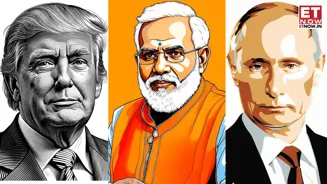As geopolitical tensions rise and energy diplomacy enters a volatile new chapter, India finds itself once again at the center of a global standoff — this
time over its sustained oil imports from Russia. U.S. President Donald Trump’s latest move to impose an additional 25% tariff on Indian exports, citing continued Russian oil purchases, has triggered a fresh round of debate: Why does India rely so heavily on Russian crude, and what are the risks if it’s forced to scale back or halt this supply?
The Russia Factor in India’s Energy Equation
Energy security has long been a cornerstone of India’s economic planning. With over 85% of its crude oil needs met through imports, India is the third-largest oil importer globally — and increasingly, Russia has become a key supplier.
Since early 2022, Russia has offered India deeply discounted crude in the wake of Western sanctions and a shifting global supply chain. These discounts, often in the range of $6–8 per barrel compared to other suppliers, have allowed India to reduce its oil import bill significantly. In FY24 alone, India is estimated to have saved nearly $25 billion by buying Russian oil at discounted rates.
ETNOWlive
1953305845342568711
On an annualised basis, India imports around 660 million barrels of oil (excluding Russia), at a daily average of 1.8 million barrels. If Russian oil were to be removed from the mix, the additional cost from other suppliers would range between $4–6 billion annually, based on current price differentials. That’s a meaningful figure — but not insurmountable in the broader fiscal context.
Why Russia? Cost, Certainty, and Strategy
Russia offers India more than just cheaper crude. It has emerged as a stable and reliable supplier at a time when volatility in the Middle East — traditionally India's main energy source — continues to cast a shadow over long-term contracts. With increasing uncertainty over OPEC+ production cuts and regional geopolitical friction, Russian oil offers a predictable and secure channel.
Moreover, transactions with Russian suppliers are often facilitated in non-dollar currencies, including the rupee and UAE dirham, reducing India’s exposure to currency volatility and providing a strategic hedge.
ETNOWlive
1953315211861012849
Will It Hurt If We Stop? Yes — But the Impact May Be Limited
Let’s be clear: walking away from Russian crude would cost India. Estimates suggest an annualised $4–6 billion in additional costs, not including the secondary effects on inflation and current account balances.
ETNOWlive
1953294257365615017
However, crude oil prices have softened over the past 2–3 years, and with a looming global slowdown and increasing OPEC+ output, the trend could continue. That could buffer the financial hit India would face by switching to more expensive suppliers like those in the Middle East or Africa.
ETNOWlive
1953313940710031836
Still, a major risk lies in supply shocks. If Russian output declines due to geopolitical escalation or sanctions, prices could spike — especially if the loss isn't offset by other producers. In such a case, India's energy bill could swell significantly, straining its fiscal balance and pushing inflation higher.
A Political, Not Just an Economic Decision
While the oil market is a commodity market, the choices made within it are deeply political. India’s oil purchases from Russia remain fully compliant with international norms, as repeatedly clarified by government officials. They are driven by national interest and economic pragmatism — not ideology.
At the same time, as President Trump’s latest tariff salvo shows, economic decisions carry geopolitical consequences. Targeting India while sparing China — which also continues to buy Russian oil — suggests the move is more strategic than symbolic.
In Summary
India buys Russian oil because it is cheaper, reliable, and strategically important. If it stops, it will pay more — but the macro impact may be contained, unless global oil prices rise significantly. However, the broader implication is the growing link between energy access and geopolitical pressure.
ETNOWlive
1953317172991689100
With trade talks stalled and Washington signaling more “secondary sanctions,” New Delhi will have to balance its energy diplomacy carefully — walking a tightrope between economic needs and geopolitical realities.






















